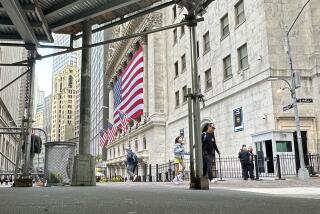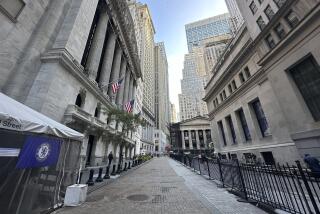STOCKS : Dow Falls 6.71 in Late Selloff; Market Mixed
Stocks snapped a three-day rally Tuesday and ended the session mixed after a late selloff prompted by a big drop in market-moving IBM shares, a market bellwether.
The Dow Jones average of 30 industrials fell 6.71 points to 2,983.90.
But the broader market was more positive, with gaining issues outnumbering losers 840 to 755 and 499 issues unchanged on the New York Stock Exchange.
Big Board volume came to 192.74 million shares as of 4 p.m., against 159.34 million in Monday’s session.
“All things considered, the market’s put on a fairly good show,” said Jeffrey Kaminsky of Mabon Securities Inc. “The Greenspan and the Group of Seven comments were in line. There were no major surprises.”
Federal Reserve Board Chairman Alan Greenspan, in testimony on Capitol Hill, said the recession had ended and a recovery begun. The G-7 rich nations, meeting in London, said nothing unexpected.
A late selloff in shares of International Business Machines spurred the Dow’s decline and erased a late rally attempt.
“As IBM started to unravel, so did the market,” Kaminsky said.
Traders said IBM, which is listed in a number of stock indexes including the 30-share Dow, fell after Donaldson Lufkin & Jenrette brokers warned their clients about the company’s upcoming second-quarter earnings report.
* IBM ended down 2 5/8 at 96 5/8, after hitting a 52-week low of 96.
Dale Tills, manager of institutional equities at Charles Schwab & Co., said the market needed “a decent news item” to move it out of the trading range.
Among the market highlights:
* Triton Energy jumped 4 3/4 to 29 3/4. Morgan Stanley raised its price target for the stock to 38 from 28, based on a significant Colombian oil find.
* Warner-Lambert eased 1 3/4 to 68 1/4 on concerns about its Alzheimer’s drug after U.S. regulators recommended the company perform more testing.
* Weitek Corp. shares tumbled 3 1/8 to 9 after the company said it expects soft product demand continuing into the third quarter. Alex. Brown cut its rating and 1991 and 1992 earnings estimates.
* Coca-Cola Enterprises fell 1 1/2 to 16 after the company’s second-quarter earnings failed to measure up to Wall Street’s expectations.
* Collagen Corp. fell 1 1/4 to 18 1/2. Alex. Brown cut its rating to “neutral” from “buy.” On Monday, the company made a disappointing earnings forecast.
* Ameritrust gained 2 to 23 3/4 after its board authorized merger talks with interested parties, including National City Corp. National City rose 3/4 to 36 7/8.
In foreign trading, share prices rose in London, but fell in Tokyo and Frankfurt, Germany. London’s the Financial Times 100-share average was up 24.3 points at 2,556.8.
Tokyo stocks closed lower after narrow, featureless trading. The key 225-share Nikkei average slipped 83.89 points to 23,375.15.
Shares were again mixed in Frankfurt. The 30-share DAX average fell 2.72 points to end at 1,643.85.
Credit
Treasury bond prices closed unchanged to slightly higher, showing little reaction to Greenspan’s testimony on the economy.
At the close of trading, the price of the Treasury’s bellwether 30-year bond was unchanged from Monday, and its yield remained at 8.45%.
Greenspan told a congressional subcommittee that the central bank doesn’t plan to move interest rates lower in the near future to stimulate the economy. He said there were “compelling signs that the recession is behind us.”
Though such news would usually be a bad sign for the bond market--lower rates benefit fixed-return securities such as bonds--it was not unexpected and had little impact, market observers said.
“Market participants weren’t expecting the Fed to change policy and therefore there was no surprise when he acknowledged there would be no change in policy,” said Kathleen Camilli, chief economist at Maria Ramirez Capital Consultants Inc.
She said the market greeted his testimony “with a yawn.”
There was little other news to affect trading.
The federal funds rate, the interest on overnight loans between banks, fell to 5.813% from 6% late Monday.
In the tax-exempt market, the Bond Buyer index of 40 actively traded municipal bonds closed at 92.675%, unchanged from Monday. The average yield to maturity remained at 7.15%.
Currency
The dollar rose in cautious trading.
Greenspan’s comments helped boost the dollar. The U.S. currency is supported by higher interest rates, which increase foreign demand for American investments.
Robert Ryan, corporate foreign exchange manager with Bank of New York Co., said traders made a mild attempt to push the dollar higher. However, the market was mindful that central banks, which intervened in the market on Friday to stop the dollar from surging, could band together again should the U.S. currency climb too much.
The market nudged the dollar past 1.800 German marks but did not press further, and the dollar ended the day in New York at 1.800 marks, up from 1.789 on Monday.
The British pound fell to $1.643 in New York from $1.654 late Monday. In earlier London trading, sterling fell to $1.646 from $1.651.
Other late rates for the dollar in New York, compared to Monday’s late prices, included: 1.56275 Swiss francs, up from 1.5483; 6.1070 French francs, up from 6.0745; 1,339.25 Italian lire, up from 1,332.00, and 1.1474 Canadian dollars, up from 1.1462.
The dollar also rose against the Japanese yen in New York where the dollar advanced to 137.25 yen from 136.94 on Monday.
Commodities
Corn futures prices soared the daily limit on the Chicago Board of Trade amid growing alarm over hot, dry weather in the Midwest.
The market also was jolted by news that the Soviet Union was actively bidding for grain and other farm products, adding soybeans and wheat to those futures posting solid gains.
On other markets, gold futures were mostly lower while silver fell; cattle were lower while pork was mostly higher, and energy futures were mostly higher.
Wheat futures settled 2 to 5.50 cents higher, with the contract for delivery in July at $2.70; corn was 5 cents to the daily limit of 10 cents higher, with July at $2.47 a bushel; oats were 1.25 to 1.74 cents lower, with July at $1.2575 a bushel, and soybeans were 5.50 to 16 cents higher, with July at $5.475 a bushel.
The excessive heat and shortage of rain may have cut corn yields by 20% over large sections of Illinois and Indiana, said William Biedermann, research director for Allendale Inc. in Crystal Lake, Ill.
On New York’s Commodity Exchange, gold was 30 cents lower to 10 cents higher, with the August contract at $369.80 an ounce and silver was 0.8 cent to 1.5 cents higher, with July at $4.367 an ounce.
Light, sweet crude oil was 3 to 20 cents higher, with the August contract at $21.65 a barrel on the New York Mercantile Exchange.
Market Roundup, D8
More to Read
Inside the business of entertainment
The Wide Shot brings you news, analysis and insights on everything from streaming wars to production — and what it all means for the future.
You may occasionally receive promotional content from the Los Angeles Times.










